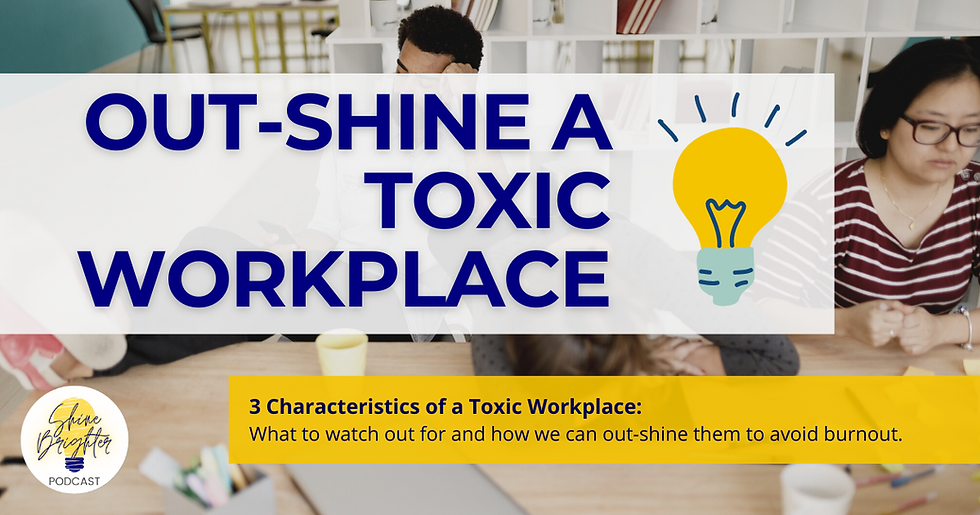The Stress Diaries: Balancing Pay, Perks, and Peace
- Beau Lunceford
- Sep 9, 2024
- 4 min read
After over a year away, I'm thrilled to be back sharing new insights on the Shine Brighter Podcast. During my time off, I experienced significant personal and professional changes that deepened my understanding of workplace stress and burnout. I launched two new podcasts for my 9-5 job, moved multiple times, and even started a non-profit! But one thing remained clear throughout: our work to combat burnout is more relevant now than ever.
As I’ve transitioned into the corporate world after over a decade in ministry and non-profit work, I’ve noticed how workplace dynamics shift as companies grow and evolve. This brings me to the heart of today's discussion—how stress, employee satisfaction, and company culture interact, and how leadership can balance these factors to create a thriving environment. Let’s dive into the "Stress Diaries."
You can listen to this Shine Brighter Podcast episode and others on all your favorite platforms. Check it out here: https://linkin.bio/shinebrighterpod
Workplace Stress and Employee Priorities
Think about how your personal priorities change when you're under stress. When life throws chaos your way—whether it's sickness in the family or financial strain—the luxuries you once prioritized quickly fall away to ensure your immediate needs are met. This is a common experience, and it plays out similarly in the workplace.
When stress levels rise in the office due to an influx of work, understaffing, or poor management, employee priorities shift to compensate. Suddenly, what was once a perk—like free snacks or team-building activities—becomes less important. Employees start asking for more tangible benefits like higher pay. After all, when stress piles up, it's only natural to expect fair compensation.
The Culture Audit: Greg’s Story
Let’s explore this through a real-world case study, which I call “The Culture Audit.” Meet Greg. He loved his job at first and even recruited friends to join his company. But after about a year, things shifted. The company became understaffed, workloads were overwhelming, and morale plummeted. Like many others, Greg started feeling overworked and underappreciated.
Eventually, Greg found an opportunity to earn nearly $15,000 more at a different company, working remotely with a more manageable workload. It seemed like the perfect solution, and though his coworkers were sad to see him go, they understood his decision.
A year later, Greg found himself financially secure but unhappy in his new role. He missed the culture and camaraderie at his previous job. Realizing that no amount of money could make up for that sense of community, Greg decided to return—even though it meant a pay cut. For Greg, being part of a workplace that valued him and offered a supportive environment was far more important than a higher paycheck.
Stress and Salary Expectations
Greg’s story highlights a key takeaway: when stress increases, employees' expectations around compensation rise as well. It’s more than just wanting more money—employees feel that extra compensation is needed to justify the additional energy and effort they’re putting into their job. On the flip side, in a low-stress environment, employees may be willing to take a smaller salary in exchange for a positive, supportive workplace.
As leaders, we need to recognize how stress affects salary expectations and respond accordingly. For some, a raise may help ease the stress, while for others, a focus on improving company culture and work-life balance might be more effective.
The Role of Company Culture in Times of Stress
I’ve always been a firm believer in the power of strong company culture. It’s one of the most critical factors in employee satisfaction and well-being. However, when stress levels rise, the value employees place on company culture can diminish. When they’re just trying to get through the day, things like team-building activities can feel like a distraction or even an insult.
But here’s the twist: when companies continue to nurture a supportive culture during stressful times, it can be a game-changer. Leadership must show appreciation, acknowledge small wins, and focus on mental health and wellness initiatives that are achievable during high-stress periods. This builds trust and helps employees feel valued, even when workloads are heavy.
In contrast, a low-stress environment allows employees to more fully appreciate the perks of a positive culture. They have the bandwidth to engage in team-building and enjoy company perks—so it’s crucial that culture remains a consistent focus, regardless of the stress level.
Going the Extra Mile
Everyone loves an employee who goes above and beyond, right? But in a high-stress environment, asking employees to give more when they’re barely keeping up with their workload is unrealistic. It’s important for leaders to recognize that during these times, employees won’t have the capacity to contribute beyond their required tasks.
In a lower-stress environment, however, employees are more likely to feel motivated and energized to exceed expectations. This reinforces the importance of fostering a positive work culture, where employees feel valued and appreciated for the work they do.
The Importance of Value
Whether stress levels are high or low, one constant remains: employees need to feel that their work is valued. When stress is high, employees may seek recognition or validation as a form of support. In low-stress environments, this translates into a desire for growth and development opportunities. Regardless of the situation, the desire for meaningful, impactful work is always present.
You can listen to this Shine Brighter Podcast episode and others on all your favorite platforms. Check it out here: https://linkin.bio/shinebrighterpod
Stress is inevitable in both our personal and professional lives, but how we respond to it can make all the difference. By understanding the dynamic relationship between stress, salary expectations, company culture, and employee motivation, both employees and leaders can work together to create a balanced and supportive work environment.
As employees, recognizing shifts in our priorities can help us make more informed decisions about our careers and well-being. As leaders, it’s crucial to respond to these shifts with empathy and understanding, fostering a culture where employees feel valued, motivated, and engaged.
What steps can you take to reduce stress in your workplace? How can you balance the needs of your employees to ensure they feel supported and appreciated? These are important questions to consider as we strive to create healthier, more sustainable work environments.
NOTES:
Listen to this blog in podcast form here: https://open.spotify.com/episode/2QoLTJPvvUFmJezoDf7oMa?si=cm85txcbSU2uONykgwxx6w
You can also listen on apple, google, and amazon!



Comments